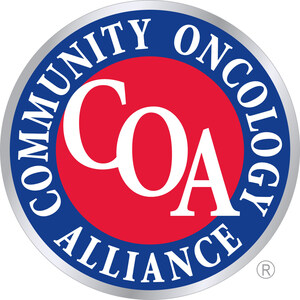Oncologists Remind America: Time To Get Cancer Screenings Back On Track
After a Year of COVID-19 Delayed Important Preventive Care, Nationwide Campaign Launches to Boost Cancer Screenings
"Time to Screen" Campaign Connects Americans With Screening Resources
WASHINGTON, April 8, 2021 /PRNewswire/ -- With studies showing an alarming drop in cancer screenings during 2020, a national public awareness campaign is reminding Americans that it's time to get screened. The "Time to Screen" campaign urges anyone needing to schedule a cancer screening, or wondering if they should be screened, to visit www.TimeToScreen.org or call 1-855-53-SCREEN (1-855-537-2733) for assistance.
The "Time to Screen" effort is a partnership between the Community Oncology Alliance (COA), a national non-profit advocacy group dedicated solely to independent oncology practices and the patients they serve, and CancerCare, a national non-profit that provides free, professional support services and information to help people manage the emotional, practical, and financial challenges of cancer.
"COVID-19 has caused many people to delay recommended cancer screenings, which are now at dangerously low levels. 'Time to Screen' is a reminder that everyone can now do something essential for their health," said Kashyap Patel, MD, president of COA and CEO of Carolina Blood and Cancer Care in Rock Hill, South Carolina. "It's safer to get screened now, rather than delaying getting checked for cancer, because early detection catches cancer when it's most treatable. It may even save your life."
A study published in the November issue of the peer-reviewed journal JCO Clinical Cancer Informatics showed a considerable drop in cancer screening, diagnosis, and treatment for older adults in 2020, including an 85 percent decline in breast cancer screenings and a 75 percent decline for colon cancer screenings. Recent data has shown an improvement in cancer screening rates, but average screening rates for the top four cancer types remain down 25 percent across the country.
Doctors are seeing an uptick in late-stage cancer diagnoses and are concerned this trend will continue unless more Americans follow recommendations to promptly get screened. Indeed, community oncologists report that they are already starting to see the traumatic results of delayed or cancelled screenings, as cancers caught at later stages require more complex treatments, resulting in higher morbidity, or worse, death.
The "Time to Screen" campaign makes it easy for anyone to learn how to schedule an appointment at a convenient location and learn more about the importance of early cancer detection. The campaign provides assistance and educational resources, including the toll-free hotline and website featuring information on screenings for breast, colorectal, cervical, prostate, lung, and skin (melanoma) cancer.
"Early detection of cancers through regular screenings saves lives. 'Time to Screen' connects Americans with local screening options and support to make appointments," said Patricia J. Goldsmith, Chief Executive Officer of CancerCare. "Through this campaign we will not only be raising awareness of the importance of getting cancer screenings back on track, but also providing important support services to help overcome any barriers that individuals need to access their cancer screenings."
"Time to Screen" will generate public awareness and action by engaging with local oncology practices, other medical professionals, employers, and health care purchasers. The campaign will also feature multi-media advertising, television and radio interviews, and more.
Support for the Time to Screen campaign is provided in part by Bristol Myers Squibb, Genentech, Amgen, Heron Therapeutics, Incyte, Janssen, Pharmacyclics, Daiichi Sankyo, Inc., Eisai, Inc., EMD Serono, Merck, Pfizer, and Takeda.
The Centers for Disease Control and Prevention (CDC) recommends routine screenings for certain types of cancer among many people age 40 and up. Preventative screenings help people maintain their health, especially for those who have a family history of cancer, because it may help detect some cancers in their earliest, most treatable stages.
Experts say screening facilities are ready to take patients and can do so safely. Facilities are following CDC guidelines to keep people safe, including testing for COVID-19 symptoms among health care staff and patients, requiring face covering, and limiting crowds.
Visit www.TimeToScreen.org or call toll-free 1-855-53-SCREEN (1-855-537-2733) to find a cancer screening option near you.
About the Community Oncology Alliance
COA is a non-profit organization dedicated to advocating for community oncology practices and, most importantly, the patients they serve. COA is the only organization dedicated solely to community oncology where the majority of Americans with cancer are treated. The mission of COA is to ensure that cancer patients receive quality, affordable, and accessible cancer care in their own communities. More than 1.5 million people in the United States are diagnosed with cancer each year and deaths from the disease have been steadily declining due to earlier detection, diagnosis, and treatment. Learn more at www.CommunityOncology.org. Follow COA on Twitter at www.twitter.com/oncologyCOA or on Facebook at www.facebook.com/CommunityOncologyAlliance.
About CancerCare®
Founded in 1944, CancerCare is the leading national organization providing free, professional support services and information to help people manage the emotional, practical and financial challenges of cancer. Our comprehensive services include case management, counseling and support groups over the phone, online and in-person, educational workshops, publications and financial and co-payment assistance. All CancerCare services are provided by master's-prepared oncology social workers and world-leading cancer experts. To learn more, visit www.cancercare.org or call 800-813-HOPE (4673).
SOURCE Community Oncology Alliance

Related Links
http://www.communityoncology.org
WANT YOUR COMPANY'S NEWS FEATURED ON PRNEWSWIRE.COM?
Newsrooms &
Influencers
Digital Media
Outlets
Journalists
Opted In



Share this article